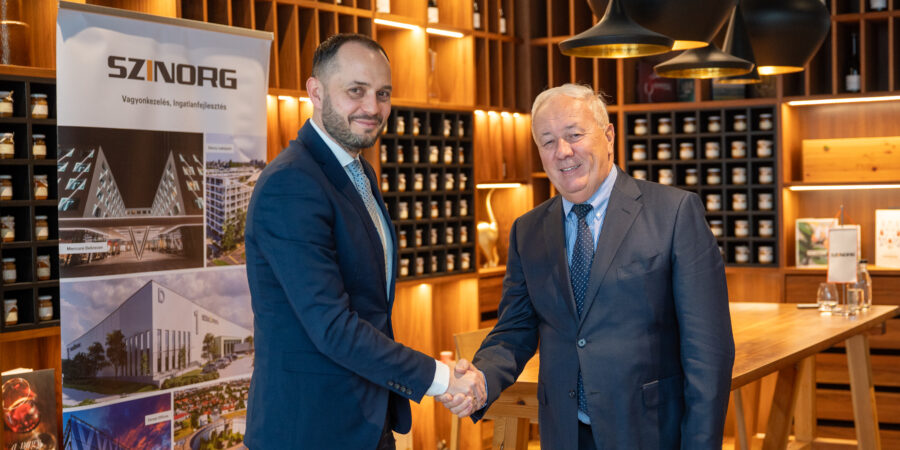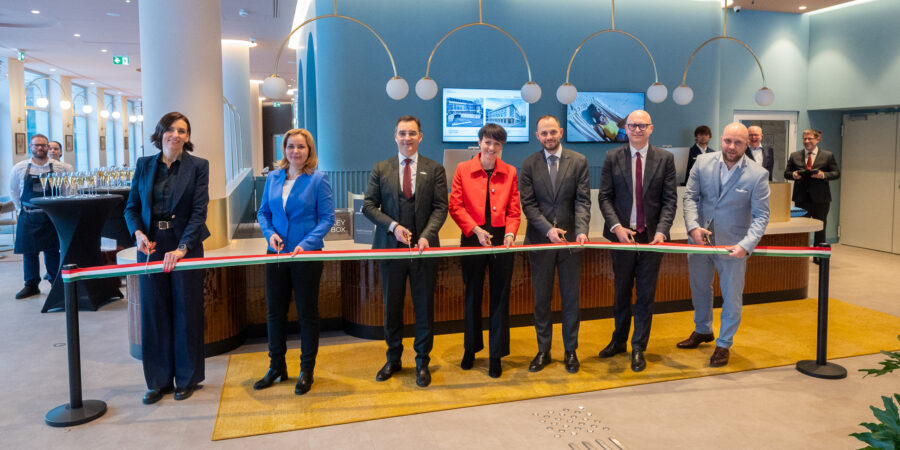Cooperation between the companies may expand the market
Instead of engaging in passive asset management, Szinorg Zrt., the holding structure of several construction companies, also including the regionally significant HUNÉP Zrt., is striving to put to use its capital on the real estate development market. As Gyula Szűcs, president and CEO of Szinorg informed us, the human resource capacities have also been recently reinforced for this purpose with the best economic specialists of the company directed to this area and a company-level system of cooperation also put in place.
Mr. Szűcs, who is also one of the principal shareholders of the group, had been the CEO of HUNÉP Zrt. until the end of 2018, when the decision was made that he would put a generation of younger colleagues, consciously prepared for this transition over many years, in charge of the operative work, while he – together with some talented specialists – would concentrate on the new task of active asset management. “On the basis of surveys, we have concluded that, parallel with the strengthening of Debrecen’s regional role, new demands will arise on a continuous basis on the real estate development market. These will appear partly as a need for residential properties, partly for commercial accommodation, for industrial and logistics developments, or even as demands for the expansion of the industrial background. Knowing the role of the city in healthcare and the health industry, I can even see a chance that a need for cooperation in real estate development may soon arise on the part of the health industry as well,” Gyula Szűcs said.

In response to the question by Figyelő as to whether the health industry demands outlined by him may be in connection with the national vaccine manufacturing plant proposed to be created in Debrecen, the businessman said that this may also be a possibility, but in addition, there may be a need for real estate developers for the realization of numerous other concepts where healthcare operators can offer a service in demand on the market, but do not possess the infrastructural background necessary for its implementation. “When I say this, I do not just have the building itself in mind, but also services such as procurement or the provision of assets for the activities that well prepared specialists intend to pursue there as a service,” he explained.
The market prospects of the group – and primarily within that, those of HUNÉP Zrt., the company generating the highest revenue in the group – are determined not only by the needs for real estate development and construction activities in connection with projects already pending in Debrecen and likely to intensify after the construction of the BMW plant starts. They must also calculate with the economic and administrative effects of the COVID-19 pandemic, which raise many questions.

“Fortunately, the pandemic did not really affect our construction activities negatively in terms of projects that are already under way. Our investments have been completed by the relevant deadlines, and those currently under construction are also progressing according to the time schedule. I do see, however, some risks for the near future, namely in terms of the decisions that provide us with work and market opportunities being made a bit more slowly and with more difficulty than before, both in the public and the private sectors, while the number of calls for tenders is also decreasing. I trust that all of this will become manageable within a year: we will have a vaccine, the slowdown caused by the pandemic will come to an end, and all of the investments that are on the agenda will soon be started.”
Szinorg, as well as the flagship construction company of the group, HUNÉP, have considerable experience in addressing the sensitivity, as well as seasonability that characterises building construction investments, and therefore they have all the reason to hope to be able to cope also with the present situation. Their current operating model – which has proved to be resistant to crises so far – was established during the 2008 recession. Downsizing in terms of its blue collar workers, the company started to operate as a general contractor, an engineering firm, and the employees were first transferred to independent companies, and later HUNÉP also outsourced some of its activities into subsidiaries established by it. The company’s scope of operations was also streamlined: discontinuing the earlier practice, they no longer undertake projects at several hundred kilometres, but decided to reinforce their presence in the vicinity of Debrecen. “Time has proven us right, as we have been able to operate profitably using this model, and therefore, this remains the arrangement both in case of HUNÉP Zrt., headquartered in Debrecen, and HC Építő Kft. in Budapest.” Szinorg is also open toward manufacturing activities serving the needs of the construction industry. One of the companies in the group, engaged in the manufacturing of aluminium curtain walls, as well as aluminium-frame windows and doors, has recently been awarded EUR 800,000, the maximum available amount in the growth support grant scheme announced by the Ministry of Foreign Economy. In the framework of this project, a new manufacturing hall will be built, with state-of-the-art, highly efficient technology.
Unlike in case of building construction projects, there seem to be no signs of a slowdown for the real estate development division. This what Gyula Szűcs said about this activity: “We will definitely complete the developments that we decided on two years ago. The pandemic has no effect on these: we are making progress, purchasing the real properties for the developments, preparing the studies, moving forward with the architectural designs, and the first ground breaking will also take place in the foreseeable future. The simple reason for this is that real estate development can only be done with long-term thinking, and we have always planned for the long run.”
Further reinforcing the real estate development division is the fact that Szinorg has recently established close cooperation with the Xanga group, which is active in the area of real estate developments, as well as the leasing out of properties. “There is a long tradition of cooperation in Debrecen: state, municipal, higher education stakeholders, as well as economic operators of the private sector share with each other the information that move them all forward,” Mr. Szűcs emphasized, “but private stakeholders are also on the right path if they find the points on which they can cooperate with others. Nobody is equally strong in every area, nobody can be equally strong in all market segments. This is the principle on the basis of which we build our collaborations, and based on what we see, this concept works well, and is useful both for our partners and for ourselves.”
The change of direction and opening of Szinorg towards other players on the real estate market is not entirely without precedents. They have worked with foreign investors coming to Debrecen before as real estate developers, and also have such projects currently under way. The future is not entirely a mystery for the Group, since the “Debrecen 2030” development programme is publicly available, which contains – in addition to the concepts radically renewing the transportation infrastructure, as well as the water management of the city and its vicinity – also several large-scale cultural and sports-related investments planned for the next ten years. Some of these projects will no doubt also appear on the real estate development market.
Margit Dombi
Cooperation between the companies may expand the market
Instead of engaging in passive asset management, Szinorg Zrt., the holding structure of several construction companies, also including the regionally significant HUNÉP Zrt., is striving to put to use its capital on the real estate development market. As Gyula Szűcs, president and CEO of Szinorg informed us, the human resource capacities have also been recently reinforced for this purpose with the best economic specialists of the company directed to this area and a company-level system of cooperation also put in place.
Mr. Szűcs, who is also one of the principal shareholders of the group, had been the CEO of HUNÉP Zrt. until the end of 2018, when the decision was made that he would put a generation of younger colleagues, consciously prepared for this transition over many years, in charge of the operative work, while he – together with some talented specialists – would concentrate on the new task of active asset management. “On the basis of surveys, we have concluded that, parallel with the strengthening of Debrecen’s regional role, new demands will arise on a continuous basis on the real estate development market. These will appear partly as a need for residential properties, partly for commercial accommodation, for industrial and logistics developments, or even as demands for the expansion of the industrial background. Knowing the role of the city in healthcare and the health industry, I can even see a chance that a need for cooperation in real estate development may soon arise on the part of the health industry as well,” Gyula Szűcs said.
In response to the question by Figyelő as to whether the health industry demands outlined by him may be in connection with the national vaccine manufacturing plant proposed to be created in Debrecen, the businessman said that this may also be a possibility, but in addition, there may be a need for real estate developers for the realization of numerous other concepts where healthcare operators can offer a service in demand on the market, but do not possess the infrastructural background necessary for its implementation. “When I say this, I do not just have the building itself in mind, but also services such as procurement or the provision of assets for the activities that well prepared specialists intend to pursue there as a service,” he explained.
The market prospects of the group – and primarily within that, those of HUNÉP Zrt., the company generating the highest revenue in the group – are determined not only by the needs for real estate development and construction activities in connection with projects already pending in Debrecen and likely to intensify after the construction of the BMW plant starts. They must also calculate with the economic and administrative effects of the COVID-19 pandemic, which raise many questions.
“Fortunately, the pandemic did not really affect our construction activities negatively in terms of projects that are already under way. Our investments have been completed by the relevant deadlines, and those currently under construction are also progressing according to the time schedule. I do see, however, some risks for the near future, namely in terms of the decisions that provide us with work and market opportunities being made a bit more slowly and with more difficulty than before, both in the public and the private sectors, while the number of calls for tenders is also decreasing. I trust that all of this will become manageable within a year: we will have a vaccine, the slowdown caused by the pandemic will come to an end, and all of the investments that are on the agenda will soon be started.”
Szinorg, as well as the flagship construction company of the group, HUNÉP, have considerable experience in addressing the sensitivity, as well as seasonability that characterises building construction investments, and therefore they have all the reason to hope to be able to cope also with the present situation. Their current operating model – which has proved to be resistant to crises so far – was established during the 2008 recession. Downsizing in terms of its blue collar workers, the company started to operate as a general contractor, an engineering firm, and the employees were first transferred to independent companies, and later HUNÉP also outsourced some of its activities into subsidiaries established by it. The company’s scope of operations was also streamlined: discontinuing the earlier practice, they no longer undertake projects at several hundred kilometres, but decided to reinforce their presence in the vicinity of Debrecen. “Time has proven us right, as we have been able to operate profitably using this model, and therefore, this remains the arrangement both in case of HUNÉP Zrt., headquartered in Debrecen, and HC Építő Kft. in Budapest.” Szinorg is also open toward manufacturing activities serving the needs of the construction industry. One of the companies in the group, engaged in the manufacturing of aluminium curtain walls, as well as aluminium-frame windows and doors, has recently been awarded EUR 800,000, the maximum available amount in the growth support grant scheme announced by the Ministry of Foreign Economy. In the framework of this project, a new manufacturing hall will be built, with state-of-the-art, highly efficient technology.
Unlike in case of building construction projects, there seem to be no signs of a slowdown for the real estate development division. This what Gyula Szűcs said about this activity: “We will definitely complete the developments that we decided on two years ago. The pandemic has no effect on these: we are making progress, purchasing the real properties for the developments, preparing the studies, moving forward with the architectural designs, and the first ground breaking will also take place in the foreseeable future. The simple reason for this is that real estate development can only be done with long-term thinking, and we have always planned for the long run.”
Further reinforcing the real estate development division is the fact that Szinorg has recently established close cooperation with the Xanga group, which is active in the area of real estate developments, as well as the leasing out of properties. “There is a long tradition of cooperation in Debrecen: state, municipal, higher education stakeholders, as well as economic operators of the private sector share with each other the information that move them all forward,” Mr. Szűcs emphasized, “but private stakeholders are also on the right path if they find the points on which they can cooperate with others. Nobody is equally strong in every area, nobody can be equally strong in all market segments. This is the principle on the basis of which we build our collaborations, and based on what we see, this concept works well, and is useful both for our partners and for ourselves.”
The change of direction and opening of Szinorg towards other players on the real estate market is not entirely without precedents. They have worked with foreign investors coming to Debrecen before as real estate developers, and also have such projects currently under way. The future is not entirely a mystery for the Group, since the “Debrecen 2030” development programme is publicly available, which contains – in addition to the concepts radically renewing the transportation infrastructure, as well as the water management of the city and its vicinity – also several large-scale cultural and sports-related investments planned for the next ten years. Some of these projects will no doubt also appear on the real estate development market.
Margit Dombi
Source: Figyelő




